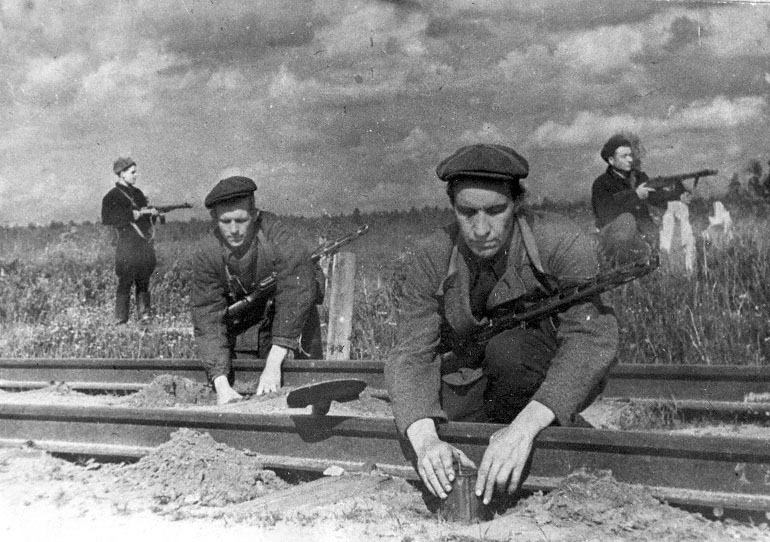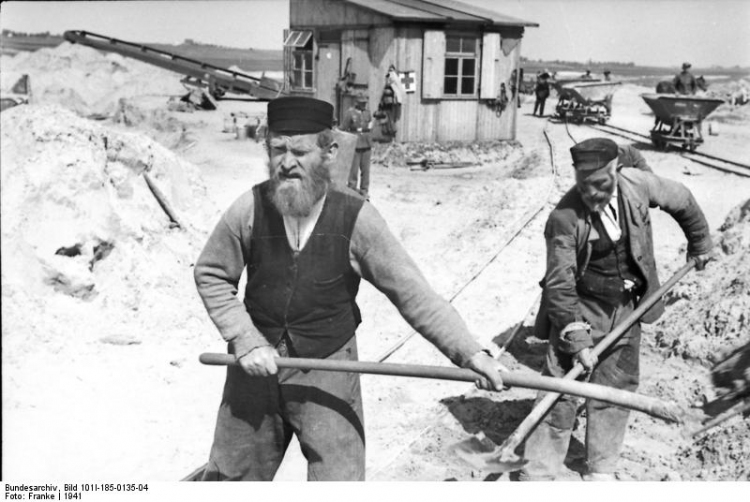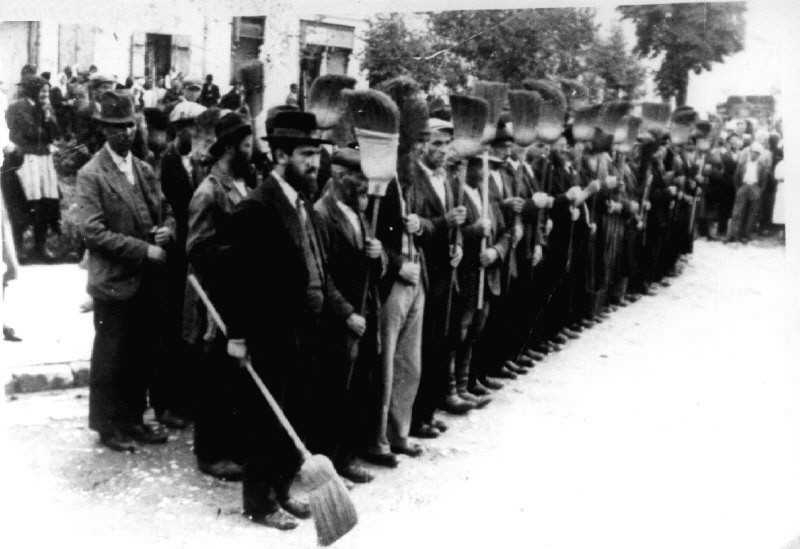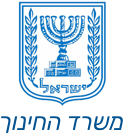The Miraculous Rescue of the Chassid, Rabbi Menashe Koenig Z”L
Stanislawow Ghetto, Shvat 5704 (1944), 80 years ago
By: Yaakov Rosenfeld, Ganzach Kiddush Hashem
It was the end of Shvat 5704 (1944).
Menashe Koenig and his friends in company 12/3 were forcibly employed in the restoration of the railroads that were destroyed by the Russian bombings and the partisan attacks.

Jewish partisans place explosives under a railroad track on which the German trains would pass
250 young Jews from Hungary worked hard as part of this work group. They were tasked with replacing the stone infrastructure and installing new tracks, each one weighing a ton.
The “safety and security” rules normally accepted in these jobs were of course not practiced there around the town of Stanislawow in Western Galicia. The forced labourers were not given rest periods, they did not observe the proper order of the height of the rail bearers – a basic condition for the survival of those doing this job (since the correct way is to line up according to height, otherwise, all the weight falls on the tallest in the group – as mentioned: a whole ton!). The boys stood in order of their names: Adler, Brent, etc. in alphabetical order…
There was not a day when members of the group did not fall, collapse, or die as a result of this arduous work.
The arrangement was that every two or three hours, one was allowed to go out if necessary, to a distance of about a hundred meters, and Menashe Koenig would take advantage of this opportunity every day. He would walk a hundred meters away from the group, stand in a corner, and put on a tefillin and pray.
Menashe Koenig did this for a month until it aroused the suspicion of the soldier who was in charge of the group, and one day in the middle of his prayer, Menashe Koenig felt the eyes of the soldier fixed on him, pouring out streams of fire. Menashe very quickly realized that the soldier was following him and caught him red-handed!
“You cheater!” he yelled.
“You lied to me that you were going out of need, and you just went to pray! Now you will learn a lesson.”
And while speaking, the healthy and strong gentile slapped the thin and weak Menashe hard on the face, once and twice, until Menashe almost collapsed from the force of the blows.
At that moment, the tortured and persecuted Menashe forgot the fact that a Jew who is forced to work under the “Jewish Law” no longer has any rights. He also forgot that by virtue of the military emergency law, on a battlefield in the middle of the war, any company commander can do whatever he wants, and as a sole judge with full authority he has the power to sentence one to death by firing squad.
His blood rose to his head. The grief, anguish, and bitter insult that had been his lot for the past three years broke out in him without restraint. He took the pickaxe, his working tool, and in a fit of rage struck the soldier’s head, and he collapsed under him in a swoon.
Only then did Menashe understand what had happened here. He was shocked and dizzy, and knew that evil had befallen him.
In the meantime, the soldier woke up and called for help, and it did not hesitate to come.
Soldiers stationed nearby jumped on Menashe and handcuffed him. The commander ordered for him to be brought back to the camp and to be imprisoned in a dungeon.
Menashe waited for the evening roll call in the camp, when it was customary to conduct the show trials, and as customary, the punishment determined by the company commander would swiftly be carried out.
In this case, it was clear to everyone that the punishment meted out to a Jew who dared to attack his superior and try to murder him would be immediate death. In general, at that time, the death penalty was often used for “disciplinary problems,” even of Hungarian soldiers, since the Germans and their Hungarian assistants had already begun to lose at the front and for any crime of breach of discipline or “undermining the fighting spirit”, certainly for “rebellion,” they would kill regularly.

Chassidic Jews performed forced labour
Menashe sat in the dungeon and began to understand the meaning of his actions. He realized that his life had come to an end, but he felt no remorse for what he had done. He awaited his death with composure, and prepared for it with faith.
The bitter news struck the other members of the company with astonishment, more than they mourned the bad fate of their friend, they worried about themselves… They understood very well what the consequences of the event would be on the treatment of them by the camp commanders. Who then had the strength for new troubles?
Then, Dr. Diamant, from the company secretariat, had an idea.
Dr. Diamant, an intellectual Jew from Budapest, was from the beginning, far from a life of Torah and mitzvahs. He and his friends were hostile to Menashe Koenig and his pious friends, but over the course of many days, the ice broke between them and after sharp conversations and debates, there was a rapprochement between them, until they grew fond of Menashe and affectionately called him “Rabbi Menashe.” They, who at heart were very far from a life of Torah and mitzvahs, suddenly saw the integrity of their hearts and the purity of the faith of the charedi (ultra-Orthodox) group. They began to understand that they were like “tinok shenishba” (uneducated religiously), and not only that, but the group of “intellectuals,” led by Dr. Diamant, would consult with Menashe and vent their worries and troubles to him.
Now, when Dr. Diamant heard about what Menashe had done and the punishment that awaited him, he stirred his mind with ideas and tricks regarding how to save Menashe from certain death, until the idea occurred to him. He waited for exercise time and then came to talk with the camp commander, with whom he had a certain relationship by virtue of his position as one of the members of the camp secretariat.
Dr. Diamant simply went out of his way for Menashe Koenig. He cried in front of the camp commander and sobbed bitterly, until the commander softened and asked him what he thought he could do in such a situation, since there was no escape from carrying out the death sentence in the face of such a serious act.
Dr. Diamant waited for this question and then said:
“In my opinion, the soldier who was beaten by the Jew must also be punished, at least by the denial of his military ranks, and this is because he did not defend himself properly against the attack of an unarmed Jew. This laziness has no place on the battlefield! The punishment must be carried out here and now so that the other soldiers learn to be more careful and aggressive.”
An hour passed and the commander called Dr. Diamant and said to him: “I feel came straight from Heaven… because a moment after I informed the soldier about the need to lower his ranks, he burst into tears and said to me: ‘Honorable Lieutenant General! Who told you that the Jew beat me, after all, only he and I were there. I simply slipped and fell on my head, and out of anger at the Jew who indirectly caused this, I ordered him handcuffed and locked in a dungeon…'”
In the early evening, in a “trial” held during roll call, the soldier claimed his new version, and the verdict was determined immediately: two hours hanging.

Roll call of Jewish slave labourers
The hanging was carried out like this: the victim’s hands were tied behind his back and hung on a tree trunk. His legs were raised about 20 cm above the ground, and every time the victim fainted, they would lower him and sprinkle water on him, and the doctor would check his heart, then they would hang him again until the next fainting, and God forbid… There were many whose souls gave away during the punishment and this too was taken into account.
Menashe fainted four times during the hanging!
As a result of this punishment, Menashe received two weeks off, during which he received a double food ration. It took him eight months to fully recover from this experience, but his life was saved.
He was further tortured in body and soul until he was able to see the liberation with his own eyes and immigrate to the Land of Israel, where he rehabilitated and was able to build a glorious home.
Thirty-two years passed, and one day, when Menashe Koenig was in a synagogue in the United States, where he had gone for the marriage of his nephew Rabbi Yitzchak Pinchas Freind, the gabbai (synagogue assistant) approached him and asked him his his name. He wanted to grant him an aliyah (calling up to the Torah).
He answered: “Menashe ben (son of) Chaim”
The gabbai turned pale and began to stammer.
“Koenig?”
“Yes…”
Menashe answered in embarrassment.
“From the 12/3 company?”
“Yes!”
Then the survivor gabbai let out a chilling roar and burst into tears.
“And we were sure that on that day you were killed for in sancitification of G-d’s Name…”
Indeed, Menashe later heard from several sources that a rumour circulated among members of the labour company that he did not survive the last hanging.
The gabbai was a survivor from the same company and therefore became very emotional when he suddenly saw the dead man standing in front of him, alive and well…
Menashe Koenig’s memories of what he experienced during the Holocaust are scattered in several places, and we will present more of them at length, but first we present you with this testimony, an amazing story that took place, according to him, exactly eighty years ago, at the end of the month of Shevat 5704 (1944), as presented in “Zachor” 5742 (1982), issue 2.







